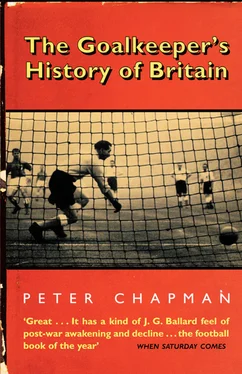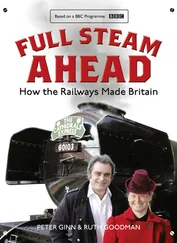1 ...8 9 10 12 13 14 ...23 When Swift was dropped from the England team, his response was, in character, more dramatic than it strictly needed to be. A little more than a year after his greatest international game, he retired. Manchester City could not believe he was giving up and kept him registered for another five years to ensure he didn’t play for another team. But he sought more security than was possible in football. A giant of a keeper, he went off to be a sales rep, for Smallman’s the Manchester confectioners.
He, at least, had relished his international career. His old rival, Sam Bartram, did not win the honour. The general view was that he was kept out of the England team by Swift’s brilliance. Then, when Frank was being lined up for replacement, it was easy to pass over Sam as too old. But short of his one appearance for England Possibles, he had not been in with much of a chance. Near deified by the fortnightly 60,000 or so who turned up to enjoy his performances at the Valley, Bartram never overcame the objections of those who watched in judgement. He was condemned by them as too sensational and for playing to the gallery. His bravery in the way he threw himself at forwards’ feet – normally a commendable feature of a keeper’s game – earned him the criticism of being a ‘danger to football’.
I heard my dad talking with his brother Reg about Bartram by the coal fire in the waiting room on Sandy station. My uncle was seeing us off after one of our monthly weekend visits – dismal night, the late Sunday train, with a probable change at Hitchin or Three Counties. Bartram was good for times like this. My uncle recalled a game against Birmingham City near the end of his career when he had left his goal to take a penalty. He ran non-stop from his own area to hit the ball, which struck the crossbar with such force that he had to chase hilariously back again after it. Sam was a great laugh like that, the shame being the selectors couldn’t see the joke.
In Swift and Bartram the selectors may have noticed something like the unruly ghost of ‘Fatty’ Foulke looming from the grave. Swift they had gone along with as an exception to the desirable rule. To have sanctioned a second showman would have risked established tradition. Protective of the nation’s sterner values, Bartram was where they drew the line. He had to get by with the unofficial title of ‘England’s greatest uncapped keeper’. He played till 1956, by when he was forty-two. At the Valley they named a set of gates after him. Seeking a living, like Swift, out of the English love of humbug and sherbet lemons, he ran a sweet shop and tried football management, without huge success.
I got his autograph on the platform forecourt of St Pancras station on a Saturday morning when he was manager of Luton Town. Had Luton been a big, as opposed to Fourth Division, club, this wouldn’t have been possible. The station would have been alive with big kids who pursued the signatures of the stars and gave any younger kids present a hard time. Bartram was tall, with a big face, wrinkled forehead and wave of sandy hair. He signed my book in front of the cafeteria, as his team grabbed cheese rolls and cups of tea before taking a train somewhere north for their afternoon game. I was aware that here was the man who had been Frank Swift’s chief rival, England’s greatest uncapped keeper. Not so long ago, that had made him one of the finest in the world, and I was surprised more people in the St Pancras steam and grime didn’t give some sign that they recognised him. He was the type who’d have happily called and waved back.
Chapter 3
In Swift’s Succession
The Swift succession played to an unprecedented audience. More than 41 million fans attended the stadiums of the nation in the 1948/9 season. Most of them were prepared to stand on exposed and crumbling terraces for the sake of an afternoon’s entertainment and they established a record that would never be beaten. With so many potentially critical eyes on them, the England selectors replaced Frank Swift by stages. In discreet British fashion, they dropped a hint here and there to prepare the crowd.
Putting Ted Ditchbum of Tottenham Hotspur between the England posts represented a return to reality. He was in Swift’s commanding physical mould at just under 6 feet 2 inches, but his style was different. Ditchburn, fearless and agile, generally did not embellish things. He was solid, consistent and, as such, more within the tradition.
A year and a bit younger than my father, he was of the generation that came to maturity in the war and had to become serious while still very young. There was no time for any of the old inter-war mood of trying to put the bad times behind you – they were on you before you knew it. Ditchburn came from Gillingham near the naval dockyards of the Medway and had volunteered for the Royal Air Force at the start of the war when he was eighteen. Younger keepers gave a new edge to the question of fitness. It was not something you had for the sake of your game or personal pride, but a matter of national necessity. Physical Training became such a high priority that it crossed the frontiers of fanaticism as PT boys were rolled off the wartime production line. Ted Ditchbum was the first of them to occupy the England goal.
Off the field at Spurs he was the players’ representative, at a time when there was talk of a strike for wages higher than the going rate of about £10. The club board threatened to put amateurs in the team. But Ditchbum was not one for ill-discipline or unchannelled aggression. He had a talent for boxing. It went with being a PT boy. If you were expert on ropes and wall bars, likely as not you could handle yourself with your fists. When done properly, it was a fine individualist art – its rules had been laid down by the gentry – which stood you in good stead against the instincts of the mob. It had for my dad when cornered by a bunch of yobs by the Roman arena in Verona. They were yelling the usual stuff about ‘British troops go home’ and edging in. So he put up an orthodox guard, left paw well forward ready to jab the first to make a move, and shouted back in Italian that they should keep coming. Good-in-a-crowd types, they backed off. Ted Ditchbum could have been a boxer, like his father had been, but he chose football and played his first game for Spurs in 1941.
Ditchbum’s military record contained an important element of sacrifice. On the verge of regular international selection, he’d been sent to India in 1944 when the call came for a dozen PTIs – physical training instructors, or so it was thought. He arrived to find the need was for Parachute Training Instructors. Once there he had to stay for two years, thus giving up the opportunity of individual honour and playing for his country for the relatively mundane duties which went with serving it. He returned to find someone else had his place in the team, but didn’t sulk and went out and played well week after week for his club. Ditchbum was made of the right material.
Fog in north Islington meant his international debut against Switzerland at Highbury had to be postponed for a day. A 6–0 victory was duly recorded the following afternoon. My dad’s youngest brother, Bim, who was eighteen and came down from Sandy by train for all the internationals, said all the action was around the Swiss keeper’s goalmouth. While the fans were fired by the moment, Ted Ditchburn had nothing to do.
It was logical to give him another run out in the side, a proper opportunity to show his international worth. For the time being, however, the selectors didn’t feel they had another one available. The function of matches like that against the Swiss was to help plug the gaps between the truly important international games. These were the home championship contests, between ourselves, the British, playing our game. Scotland were the chief opponents, but Wales and Ireland could never be taken for granted. Their players, with few exceptions, played in the English league, the ‘finest in the world’. Foreign international teams were brought over for the delectation of the masses, the fun part of a bread and circuses exercise. With the basics of daily sustenance now in such short supply, their role was all the more significant. Like Christians in the Colosseum, they provided a chance for the lions, without excessive exertion, to keep themselves in trim. No team from abroad had managed so much as a draw against England on home soil.
Читать дальше












